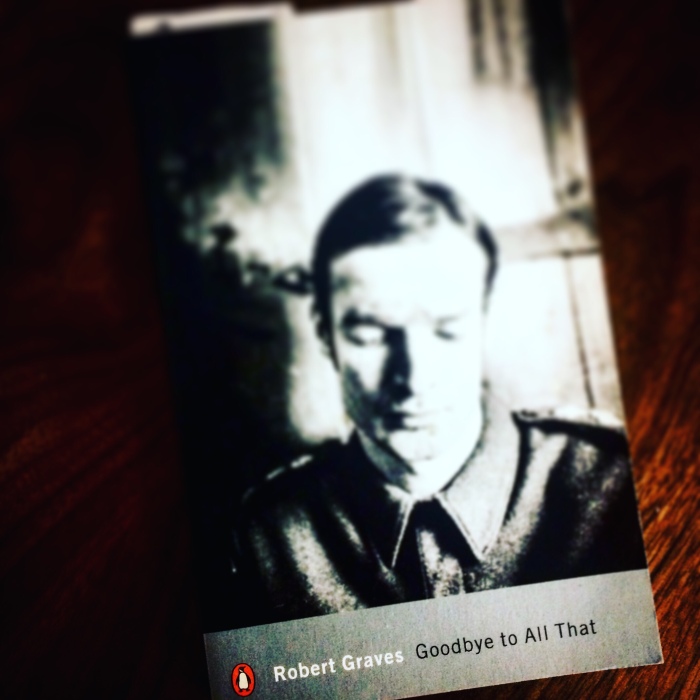
Robert Graves (1895-1985) was from London and grew up to be a poet, don’t you know it, as well as an author, critic, and promoter of antiquity.
He fought in World War I having enlisted without hesitation (as many young men did during the day, expecting it to be over rapidly) and was something of a maverick throughout his life. This made him a controversial figure amongst his peers.
In 1929, Goodbye to All That was published as a “bitter leave-taking of England” – it was a candid and controversial autobiography that cost him numerous friendships.
Almost 90 years after its publication, for modern readers it’s an intimate and fascinating account of life from a century ago – a coda from history, if you will. And for Graves, it was a bitter account of his life in England, up to the point where he legged it “never to make England my home again”.
Goodbye to All That
Starting with his childhood before moving onto his deeply unhappy years in lower education, young Graves was a charming social misfit due to his outspoken nature and subversion of traditions. His solution? He pretended to be mad and turned to poetry to keep himself occupied.
His rebellious ways continued into Goodbye to All That, written when he was in his early 30s (you’re still allowed to be impish and immature at that age, trust us).
Having fought during WWI and suffered a terrible injury in the Battle of the Somme (he was reported as dead, such were his injuries), post-war he was depressed and incapacitated for some years.
Such experiences, the war and his unhappy time in education, shape much of Goodbye to All that. He treated this time with ridicule – his irreverent humour is displayed in bouts of mockery, from the nature of routine in the British army to mindless patriotism.
This would have rankled many Brits during the era. However, other issues on his radar were atheism, feminism, socialism, and pacifism (WWI being the war to end all wars, of course), so he was a progressive writer several decades ahead of his time.
But this is, at heart, an intimate autobiography about struggling against adversity. Whilst he passed judgement on the way of the world at the start of the 20th century, and he covered WWI extensively (including the terrible PTSD brought on by what he endured), his cultural work also introduced him to the likes of George Mallory, Thomas Hardy, and Siegfried Sassoon (whom he fell out with after this book was published).
Whilst the book is funny and satirical, then, there’s also the underlying undertones of a man feeling alienated from British life.
Traumitised by warfare, he was uncertain with his lot in life and took to escaping so he could find something to live for. It’s a work that also details reputed atrocities – British soldiers killing German POWs – making it an unapologetically dark, moving, and complex account of a terrible time for the world.
Graves
Graves and his wife, Laura Riding, moved to Majorca in the 1930s with his children. He returned to London briefly when his marriage fell apart.
He was able to keep working up until age 80, when memory loss stopped him and he retired in 1975. Despite this, he had hundreds of his works published and, as you can hear in the clip above, he’s one of the most famous WWI poets.
As for Goodbye to All That, there’s a cheeky sense of rebellion sprinkled throughout, with a very British sense of humour, but it is a serious piece of writing. It’s sad reading, especially in the knowledge of his post-war struggles.
It’s an essential read as a result, one that captures the sadness of the era – when heroic young men fastened a bayonet to their rifles and went stumbling uncertainly into the wilderness.

A wonderful review. I hope to read this, as a history buff I think I would enjoy it.
LikeLiked by 1 person
It’s very detailed – his life explained to enormous extent, but it’s never self-indulgent. Fabulous stuff.
LikeLiked by 1 person
Can’t wait to
Read this book. Thank you PM.
LikeLiked by 1 person
Snot a problem. Snot a problem.
LikeLiked by 1 person
Graves’ book has been sitting on my ‘must read this immediately’ pile for some time!
LikeLiked by 1 person
It’s definitely one I think you’ll enjoy, he really does rip into the British army at times. It’s like Blackadder Goes Forth.
LikeLiked by 1 person
One of my favourite comedies ever (along with the other three Blackadder series, the Blackadder specials, ‘Allo ‘Allo… and everything Spike Milligan and Monty Python ever did ). Yes, I do need to bump Graves up the pile a bit, methinks…
LikeLiked by 1 person